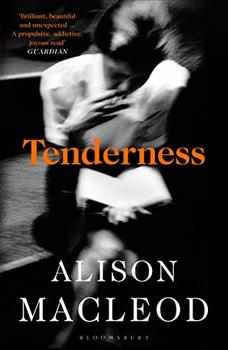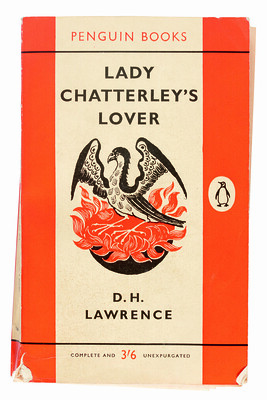Summary | Excerpt | Reviews | Beyond the Book | Read-Alikes | Genres & Themes | Author Bio

This article relates to Tenderness
 During the 1920s, author D.H. Lawrence wrote several manuscript versions of his famous Lady Chatterley's Lover, as is reflected in Alison MacLeod's 2021 historical novel Tenderness. Lawrence's earlier novel The Rainbow had been banned for its exploration of human desire, including a lesbian affair, and his agent was hesitant to commercially publish Lady Chatterley's Lover due to its sexually explicit depictions of the extramarital relationship between the title character and gamekeeper Oliver Mellors. Lawrence took matters into his own hands, arranging for a private printing of a limited edition in Florence, Italy, through Giuseppe Orioli at the Tipografia Giuntina.
During the 1920s, author D.H. Lawrence wrote several manuscript versions of his famous Lady Chatterley's Lover, as is reflected in Alison MacLeod's 2021 historical novel Tenderness. Lawrence's earlier novel The Rainbow had been banned for its exploration of human desire, including a lesbian affair, and his agent was hesitant to commercially publish Lady Chatterley's Lover due to its sexually explicit depictions of the extramarital relationship between the title character and gamekeeper Oliver Mellors. Lawrence took matters into his own hands, arranging for a private printing of a limited edition in Florence, Italy, through Giuseppe Orioli at the Tipografia Giuntina.
These 1,000 signed and numbered copies reflected the bookmaker's art of the time: letterpressed deckle-edged pages, bound in mulberry-colored boards covered by paper, with an elaborate phoenix motif embossed on the front cover. Today, rare copies of this 1928 limited edition are offered through antiquarian booksellers for thousands of dollars. Lawrence authorized an additional 200 copies in a limited run.
Immediately, unauthorized publishers began to pirate and distribute the controversial novel. Following public curiosity that arose upon claims of Lady Chatterley as "vile," "dirty," "obscene" or "smutty," Lawrence capitalized on the notoriety and sales potential. He authorized an edition printed in Paris in 1929 that included his new introduction "My Skirmish with Jolly Roger," lambasting those who had pirated the book.
Distribution of private editions was erratic up to and following Lawrence's death from tuberculosis in 1930, as the novel was banned in both the United States and Britain. Expurgated editions (with lovemaking scenes and four-letter words removed) were subsequently released commercially, in 1932 by Martin Secker in London and Knopf in New York. Various other expurgated editions followed over the decades. The novel enjoyed increased visibility, inspiring publication by mainstream publishers intent on turning a profit, and court decisions in the late 1950s and early '60s would finally allow for commercial distribution of the uncensored version.
In the United States in 1954, New York publisher Barney Rosset of Grove Press wanted to issue a new edition of the original text novel. He asked a friend in France to mail him copies of the unexpurgated books, attempting to instigate a conflict with the U.S. Post Office that would be the basis for a lawsuit. When the Collector for Restricted Merchandise of the postal service declared the book "obscene" and suitable for seizure, Grove Press challenged the matter. In July of 1959, Judge Frederick van Pelt Bryan ruled in favor of Grove Press, stating that the book was not "dirt for dirt's sake'" but rather "an honest and sincere novel." In his court ruling, Justice Bryan wrote, "It is essential to the maintenance of a free society that the severest restrictions be placed upon restraints which may tend to prevent the dissemination of ideas."
In Britain, Penguin printed an uncensored version in 1960 but was stonewalled in distribution by censors. British Parliament had passed the Obscene Publications Act in 1959 to legally distinguish pornography from literary work of artistic merit. The Lady Chatterley jury trial, reflected in Tenderness, was a test case. The government lost this case, unable to convince jurors that the book was likely to corrupt readers with its 13 "bouts" of sexual intercourse and numerous instances of the f-word.
Lady Chatterley's Lover has endured; it remains in print nearly a century later, in a variety of editions; it has been translated into numerous languages and adapted for the screen — including in an upcoming Netflix/Sony series starring Emma Corrin. The novel is widely lauded as a springboard to complex examinations of female desire, sexual relationships and class constraints. Some might even deem it quaint in current cultural terms, as issues of sexuality and gender are now much more often in daily headlines.
Unexpurgated Penguin edition of Lady Chatterley's Lover, courtesy of UK Government's Department for Digital, Culture, Media and Sport
Filed under Books and Authors
![]() This article relates to Tenderness.
It first ran in the November 17, 2021
issue of BookBrowse Recommends.
This article relates to Tenderness.
It first ran in the November 17, 2021
issue of BookBrowse Recommends.
Your guide toexceptional books
BookBrowse seeks out and recommends the best in contemporary fiction and nonfiction—books that not only engage and entertain but also deepen our understanding of ourselves and the world around us.